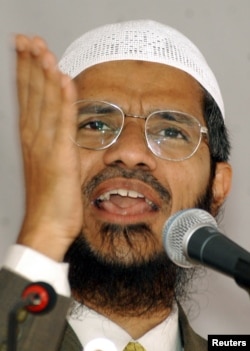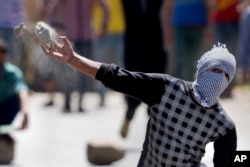Bangladesh has begun cracking down on the activities of a popular Indian Muslim preacher alleged to have inspired at least two of the suspected Islamist militants who killed 20 people in a Dhaka restaurant this month.
India has also launched an investigation into the popular and influential Zakir Naik, who has denied supporting terrorism.
His Peace TV channel has been banned in Bangladesh, and authorities are trying to restrict his social media activities, through which he reaches millions of his followers.
The crackdown has been criticized by Muslim community leaders but welcomed by some Hindu groups in India.
“Almost eight years ago, police informed the Indian government about Zakir Naik’s venomous speeches and their negative impact on the society," Tapan Ghosh, leader of Hindu Sanhati — an offshoot of right-wing Hindu group Rashtriya Swayamsevak Sangh — told VOA. "But to appease Muslims, with an eye on the Muslim vote bank," the government of then-Prime Minister Manmohan Singh "did not act against his activities. Now, by acting against Naik’s activities, the government has taken a good step.”
Preacher 'perfectly clean'
Maulana Khalid Rasheed Farangi Mahli, an imam in the Indian city of Lucknow, said that the charge of terrorism against Naik was “completely untrue" and "all the charges leveled against him are baseless.”
“Let all the inquiries be in place. He will come through perfectly clean," he said.
The India-born Naik, a medical doctor, is known for promoting Salafism, which follows a conservative interpretation of the Quran. He is famous for debating with experts from other religions in his televised programs, discussing not only the Quran but also the Bible and the scriptures of Hinduism.
Critics charge that Naik, a Sunni Muslim, often makes disparaging remarks about other sects of Islam and other religions. Some even accuse him of stoking terrorism through his speeches, noting that some identified Islamist terrorists across the world were among his fans.
Following the July 1 attack in Dhaka in which 20 people were killed, it was reported by Bangladesh police that two of the attackers in the case had followed Naik on social media.
Naik has more than 14 million followers on Facebook, with the largest share, an estimated 4 million, coming from Bangladesh.
Moves to restrict preacher
Bangladeshi Information Minister Hasanul Haq Inu said that the government banned Peace TV and blocked its website because Naik's lectures “appeared provocative.”
“Zakir Naik’s speech provokes militancy, that’s one point," Inu told VOA. "His teachings conflict with Bangladesh’s centuries-old Muslim culture, practice and rituals. Many Islamic scholars in our country do not agree with his teachings. His interpretation does not go in line with the teachings of the Quran, hadith and sunnah [records of the deeds and teachings of the Prophet Muhammad]. To maintain peace we have banned the TV channel.”
India ordered an investigation into Naik's activities last week.
India’s junior home affairs minister, Kiren Rijiju, said Indian agencies were seriously investigating the case because the speeches of Naik were a “matter of concern."
Nine teams, including India’s National Investigation Agency and Intelligence Bureau, have begun working on the issue, an Indian Home Ministry report said.
Naik rejects allegations
Naik said he was shocked at the charges leveled against him.
“I do not support terrorism or violence in any form whatsoever," he said Tuesday in an online media statement from Saudi Arabia, where he has been on a pilgrimage. "I have never supported any terrorist organizations and have mentioned this over and over again in thousands of my public talks worldwide. Most of the clips shown on the television of myself are either out of context, half statements or doctored. So are my statements in the print media.”
Zafarul-Islam Khan, a New Delhi-based Muslim community leader, said that by “hounding” Naik, the government was aiming to harass all Indian Muslims.
“In the name of fight against terrorism, the Muslims, their leaders, their preachers are being placed under torture," Khan told VOA. "The crackdown against Mr. Naik is aimed at harassing the entire community and cornering them in a situation where they are denied all their rights guaranteed by the constitution."
Dhaka-based social activist Pinaki Bhattacharya said the government of Bangladesh should have investigated the related charges meticulously before banning Peace TV.
“We may slap a charge on somebody or some groups, but we cannot deny them their rights to defend themselves,” Bhattacharya told VOA. “Peace TV was not given a chance to defend itself. That has been unfair.”














